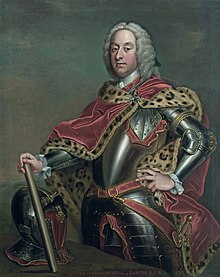James Campbell | |
|---|---|
 | |
| Governor of Edinburgh Castle | |
| In office 1738–1745 | |
| Monarch | George II |
| Preceded by | Lord Ross |
| Succeeded by | Lord Mark Kerr |
| Member of Parliament for Ayrshire | |
| In office 1727–1741 | |
| Preceded by | John Montgomerie |
| Succeeded by | Patrick Craufurd |
| Personal details | |
| Born | c. 1680 Lawers, Perthshire |
| Died | 11 May 1745 (aged 64–65) Antoing, Austrian Netherlands |
| Spouse(s) | Lady Jean Boyle Mure (m. 1720) |
| Children | 2, including James |
| Military service | |
| Allegiance | (1693–1707) (1707–1745) |
| Branch/service | (1693–1707) (1707–1745) |
| Rank | Lieutenant-General |
| Battles/wars | |
Lieutenant-General Sir James Campbell,[a] KB (c. 1680 – 11 May 1745) was a Scottish military officer and Whig politician who sat in the British House of Commons from 1727 to 1741, representing the constituency of Ayrshire. A distinguished cavalry officer, Campbell began his military career at a young age and fought in several conflicts of the Second Hundred Years' War, along with serving as the governor of Edinburgh Castle from 1738 until his death in 1745.
Born in Lawers, Perthshire into an aristocratic Scottish family, Campbell joined the Scots Army when he was just thirteen years old. During the War of the Spanish Succession, Campbell served in Europe in the Royal North British Dragoons, fighting in the battles of Blenheim, Oudenarde and Malplaquet and rising to the rank of lieutenant-colonel. Following the war's end, Campbell became involved in politics, supporting the succession of the House of Hanover.
In 1720, Campbell married Lady Jean Boyle Mure, with whom he had two children. Seven years later, Campbell was appointed Groom of the Chamber by George II of Great Britain in recognition of his military accomplishments. Campbell took his seat in Parliament after running unopposed in the 1727 British general election. A steadfast Whig when in Parliament, Campbell continued to climb the British Army's ranks, being promoted to lieutenant-general in 1740.
In 1742, the War of the Austrian Succession broke out and Campbell accompanied a British force to Continental Europe, where he participated in the Battle of Dettingen and was knighted. Campbell continued to see action in Europe, commanding Pragmatic Army troops which fought a French army near Antoing in 1745. During the battle, Campbell led several cavalry charges against French troops, and died of his wounds after a French cannonball tore off his leg.
- ^ Irving 2012, pp. 93–94.
Cite error: There are <ref group=lower-alpha> tags or {{efn}} templates on this page, but the references will not show without a {{reflist|group=lower-alpha}} template or {{notelist}} template (see the help page).